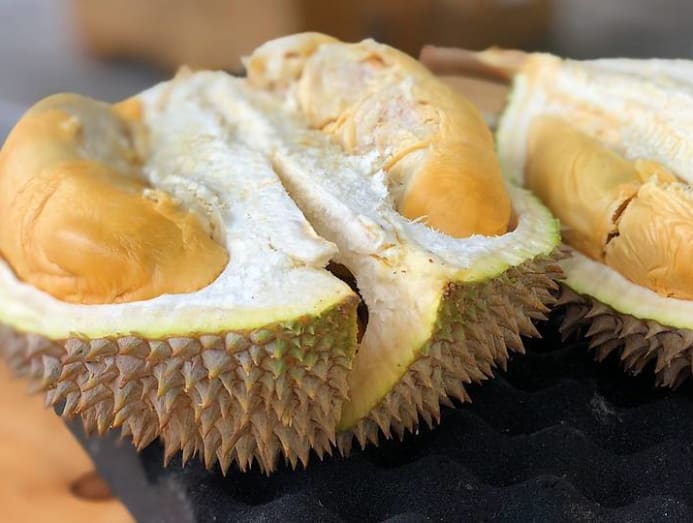Can you get allergies from eating durian? Why is drinking alcohol a no-no?
It’s durian season again, so CNA Lifestyle asked medical experts to shed light on some prickly questions you might have before digging in.

(Photo: Nicholas Yeo/AFP)
It’s that time of the year again when you can’t walk past the neighbourhood fruit stalls without seeing styrofoam boxes filled with seductively plump, creamy, yellow, durian flesh.
But what if the very treat you’ve been looking forward to all year is causing your body to reject it in the most worrying fashion?
In the case of my colleague, who had no prior health issue eating durian, the few bites she had recently brought on a potentially life-threatening swelling of the throat and lips.
Although there aren’t many such allergy cases in Singapore (thank goodness), “there are a few cases of suspected durian allergies during the durian season,” said Dr Benjamin Loh, a resident doctor at DTAP Clinic Bencoolen,
“Based on research literature, there is only one study that looked into durian allergies,” he said, underscoring the rarity of such cases.
WHY THE SUDDEN ALLERGIC REACTION TO DURIAN?
The bad news is, it is possible to develop an allergy to durian later in life, said Dr Loh. An allergic reaction is when your body mistakes something innocuous (in this case, durian) as harmful and over-reacts to fend it off, resulting in classic symptoms such as body rashes, a runny nose, diarrhoea, vomiting, shortness of breath … you get the idea.

You might think the allergy to durian is a recent development but it has actually been brewing for a while.
Here’s the thing: Your body might have reacted that way to durian in the past but if it was a very mild reaction, you might not have registered it. But over time and with subsequent exposure to the same allergen, the body becomes sensitised and reacts even when exposed to a tiny amount of it, said Dr Loh.
READ: Thai durian stall manned by out-of-work gym owners as fitness rooms close
What is it in durian that is likely to cause an allergy? Dietitian and founder of Aptima Nutrition & Sports Consultants, Jaclyn Reutens, said that it is possibly the sulphur content in durian “because there are individuals who are allergic to sulphur”.
“Other than sulphur compounds, I do not see any other component in durians that could possibly trigger any reactions,” she said.
Durian enthusiasts may try every trick in the book to overcome their allergy. Some may try to counter the reaction with more durian in the hopes of desensitising their bodies to the allergen. Others may take antihistamines before eating durian. Do these methods work? Should you try them?
It’s best not to, said Dr Loh. For one, there’s no telling how severe your allergic reaction will be when exposed to even the tiniest bit of durian.
For the same reason, it’s not prudent to take a pre-emptive antihistamine, thinking that will stop your durian allergies from acting up. “If a person has a history of severe allergic reaction to durian, it is not advisable. There is no way to predict how the next allergic reaction will turn out, especially when there’s a potential of a life-threatening allergic reaction,” said Dr Loh.
SHOULD YOU AVOID DRINKING ALCOHOL WHEN EATING DURIAN?
Reutens highlighted that durians’ sulphur compounds (the very chemicals that give the fruit its odour) could also affect some individuals’ ability to process alcohol – giving rise to the urban myth that mixing alcohol and durian is fatal.
“One clinical study showed that a key enzyme for alcohol metabolism was inhibited in the presence of high sulphur levels, which resulted in heart palpitations and vomiting,” she said. This was only one study and the theory is not conclusive but she said it might explain why some individuals feel ill after mixing alcohol with durian.

Another reason not to crack open a can of beer to wash down some durian is that there are individuals with an inherited form of enzyme deficiency that reduces their ability to break down alcohol. And durian might contain substances that further reduce the liver’s ability to break down alcohol, said Dr Loh.
MUST YOU EAT MANGOSTEENS WHEN YOU’RE HAVING DURIAN?
Not really, said Reutens. “There is no nutritional theory to pairing mangosteens with durian.”
But there’s no harm in eating mangosteens, whether with or without durian. “From a medical point of view, mangosteen’s Vitamin C content is an advantage, providing the body with a water-soluble (easily absorbed) antioxidant, while warding off infections and scavenging harmful, pro-inflammatory free radicals,” said Dr Loh.
READ: 6 powerful foods that can help you eat your way to a stronger immune system
Mangosteens also have B-complex vitamins such as thiamine, niacin, and folate to facilitate the body to metabolise carbohydrates, protein and fats.
ARE DURIANS UNHEALTHY?
Here’s a breakdown of durian’s nutritional profile. On average, each seed contains:
- 45 calories
- 8.4g carbohydrate
- 0.7g protein
- 1g fat
- 0.8g fibre
- 112mg potassium
- 8mg magnesium
- 7mg Vitamin C
“The bitter varieties are slightly lower in calories due to their lower carbohydrate content than the sweeter varieties,” said Reutens.
“Nonetheless, this is not a reason to overindulge in the bitter varieties because durian is still an energy-dense fruit. Especially for those who are diabetic, the carbohydrates in durian will cause a sharp rise in their blood sugar levels.”
Durians, being high in fat, take a longer time to digest than other fruit. “If we eat them too quickly, which I’m sure most of us do when they are in season, there is a chance of overeating,” said Reutens. “Hence, some indigestion may follow.”





